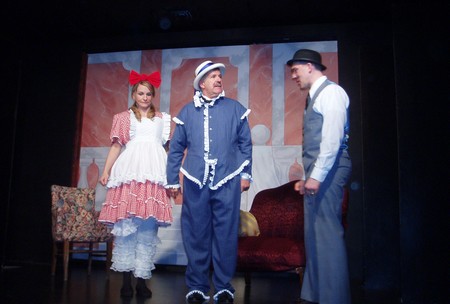Sense memory is Stanislavsky’s term for our recollections of our real sensations and how we react to our sensory perceptions. Sight, hearing, touch, taste and smell are our personal radar. If the actor is doing something special, perhaps it’s because he’s showing a kind of super-sensibility, feeling, hearing and seeing with more intensity than the ordinary person, even when playing someone who does not appear to be very sensitive. A director friend described this as ‘high energy super life. I approve of his metaphor, as acting is such a mysterious activity that at times it can only be described in metaphors (and an actual account of what actors do would make us summon the men in white coats).
We must train and refresh our use of sense memory. It’s an instrument that helps us to create the physical world of a character. The actor playing King Lear must recall many sensations: Lear is hungry, he is cold, he stands in pouring rain, in wind, in darkness, he is assailed by thunder and lightning, he feels immense fatigue, he feels the weight and frailty of his own body; the actor is conveying Lear’s realization, perhaps for the first time, of what it is to be mortal. Without a powerful sense of physical reality he is nothing, merely an actor speaking wonderful language against a background of effects.

Being human is very much to do with sensory reality, and these things have power to move us: a starving beggar tears at the food he is given, and we eat and rejoice with him, drunken glutton stuffs yet another choice morsel into himself, belches, and we are moved to disgust and anger. A freed prisoner steps out into the day, blinks and weeps at the light, and inhales the fresh air as if it were wine. He has been used to semi-darkness, to the stink of bodies, dirt, dust, excrement, harsh disinfectant. He rubs his wrists; he tentatively stretches his limbs, savoring the feeling of not wearing fetters.
Find time to experiment with states of being. Sit relaxed and close your eyes, and remember from your own experiences everything you can about what it is to see, hear, touch, taste and smell. Don’t forget, the special quality of the actor is to give depth and intensity to the most ordinary experiences. In Western urban society we are surrounded by a multitude of sensations: noise, industry, and music, screen images, traffic, advertisements, foodstuffs – dazzle, scream, stink and seduction. So pick your subject for contemplation and concentrate. Here are some suggestions for sensory experiences on which you might focus:
You’re sitting at a garden table, freezing cold, no gloves, no hat. A friend brings you a steaming hot cup of coffee and a woolen bonnet. Pull on the bonnet, down over your frozen ears, warm you frozen fingers on the mug, smell the steam rising from the coffee.
A beautiful person walks slowly towards you. Remember the rhythm of their movement, the smile on their face. They bend down and kiss you. Smell their scent and feel the touch of their lips.
We react physically to space. Imagine you are in a wide and beautiful landscape, at rest, just looking at it, its soothing colors, balmy atmosphere, and sense of peace. Now remember confinement, claustrophobia, darkness; remember the most uncomfortable place in which you’ve ever been.
Recall the activity you do with the most ease and pleasure: it may be dancing, swimming or walking, but try to remember the pleasure of an exuberant activity. Remember the nature of objects, the differences of texture between silk, leather and coarse wool. Think about the pleasant sensuous texture of, say, a beautiful piece of clothing, and compare it with a repulsive and filthy set of rags.
In your memory, recall sounds, music and voices, the most frightening sounds and the most pleasing. Remember a piece of music that has the power to make you weep.
As civilized people we like to think that we have a great ability to respond to our environment, but it is very probable that we shut things out and look away from what is repugnant to us, and uncritically indulge in that which gives us pleasure. And this shows in performance, when an actor sees but doesn’t hear, touches but doesn’t taste. Acting for the camera, which takes in every detail, needs absolutely truthful evidence of the senses?